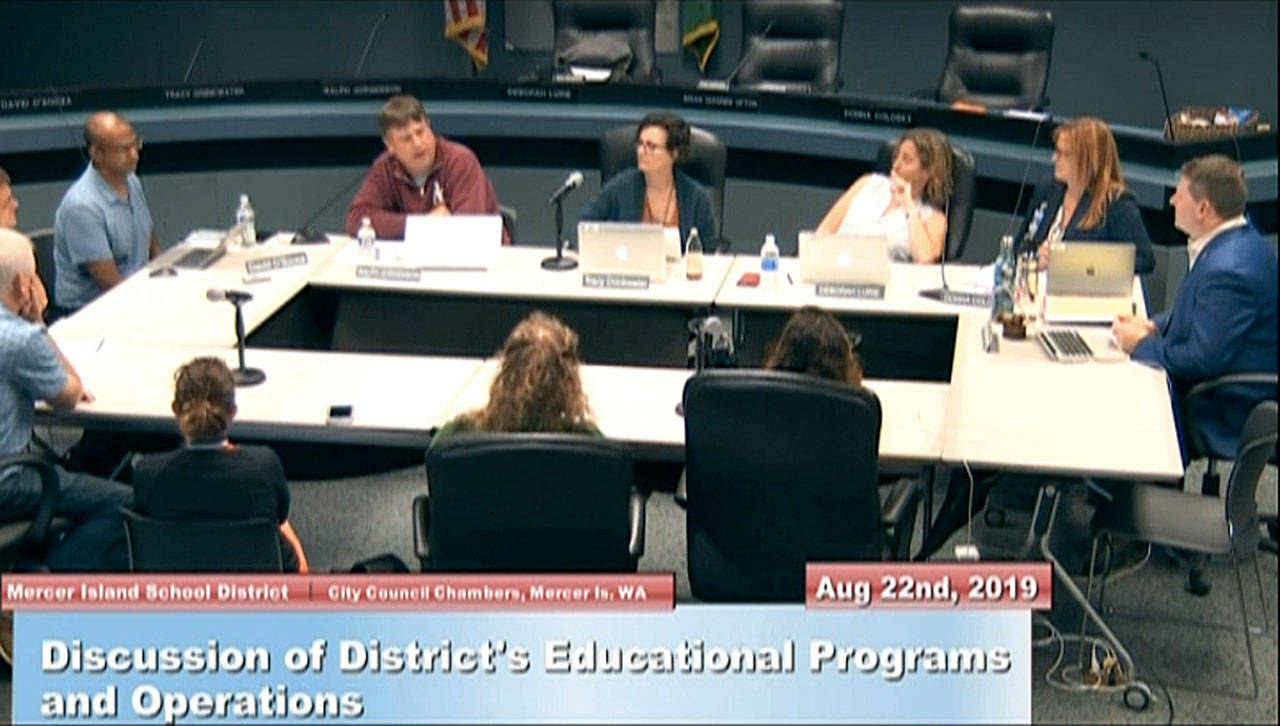The Mercer Island School Board invited the Island community to a linkage session at the last board meeting on Aug. 22. at City Hall.
The linkage session served as an opportunity for the community to discuss and provide input regarding the district’s educational programs and operations, including the district’s budgeting and financial planning.
Brian Giannini Upton, the school board president, said the opportunity for community members and board members to have a conversation like this is somewhat rare and said he was happy to have the opportunity.
Five community members attended the linkage session with the school board.
For the meeting, Giannini Upton said there wasn’t a set agenda or a set list of topics to discuss, leaving it open to whatever the community members wanted to talk about.
Stephanie Bull, the registrar and business manager at Youth Theatre Northwest (YTN), brought up the topic of school buses no longer going to after school classes. According to Bull, the Mercer Island School District (MISD) has been busing kids to YTN for more than 20 years.
“It’s vital to many of our students. About 55 percent of our students ride the bus to our after school classes, and that’s about three to five students per bus,” she said. “It may seem like a drop in the bucket, but it’s 55 percent for us.”
She said the students don’t have any other way to get to class, and the students want to pursue theater.
“I would please beg you to reconsider to make art enrichment accessible to all students on Mercer Island,” she said.
MISD Superintendent Donna Colosky said the changes in transportation to smaller non-district sponsored clubs and activities were determined last spring.
She said one of the primary reasons for the decision was the district’s ability to secure drivers with the sufficiency to retain home to school needs.
“Obtaining drivers has been a significant challenge for almost all districts, not just us,” she said.
Colosky said that existing programs and athletic activities place a significant demand on the transportation department. She noted several of the high school clubs and activities have to use charter buses for transportation.
“The reliance on charter buses alone cost the district tens of thousands of dollars a year,” she said.
Other reasons for the district’s decision to suspend bus transportation to YTN included an inability to secure staff supervision while students are waiting to board the bus after school and the scale and number of available seats on school bus routes.
Colosky said the nature of many of the programs that have been excluded from transportation for the upcoming year were variable in nature. She said students were not attending sessions on a daily schedule and it created “quite a district quagmire” for the transportation department trying to accommodate numerous individual student transportation requests.
“The only really viable option would be to establish two activity routes to meet the external program enrollments,” she said. “This would require the purchase of at least two buses and two more drivers.”
She noted the Boys and Girls Club and the Stroum Jewish Community Center (SJCC) have their own means of transportation.
Colosky said when the district made and communicated the decision last spring, the district hoped there would be other plans made to carpool or other ways for the organizations to sustain transportation for students.
“As a district it had just become really problematic for us both budget-wise and as well as logistically,” she said.
Bull said YTN won’t know how the lack of district transportation will affect them until next fall.
“I did want to come here and make our voices heard, and honestly, we will continue to make our voices heard,” she said. “I do hope that there’s more of a connection with the school district and YTN again.”
School Board Member Tracy Drinkwater said the board values YTN and thinks it’s a wonderful organization.
“There’s no disagreement with many of the fabulous things that parents say about YTN, but as you can see, we are constrained too,” she said. “We do want to support, but in this case, right now, it’s very challenging for us.”


